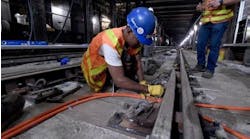LA Metro’s Potential Ballot Measure/Draft Expenditure Plan Input Process Draws Thousands
Tens of thousands of local residents either participated in public outreach forums or commented on Metro’s draft expenditure plan for a potential ballot measure, the agency announced Thursday. Members of the public, key stakeholders and elected officials were involved in the forums.
Nearly 48,000 people participated in 14 Telephone Town Hall meetings in May with 219 people asking questions and 455 leaving voicemail messages about the draft expenditure plan.
During those meetings, 81 percent of respondents said they would support a tax to keep Metro’s system in good working condition. When asked if they would support the proposed sales tax if the election were held that day, 68 percent said yes.
“These Telephone Town Hall meetings are an effective way to reach people who aren’t able to attend a traditional public meeting, but will participate in a live telephone forum from the comfort of their home,” said Pauletta Tonilas, Metro’s Chief Communications Officer. It gives our Board members and staff a chance to educate the public, answer their questions and get feedback in an informal, convenient, ‘live radio program’ format.”
The public input summary was presented today to the Los Angeles County Metropolitan Transportation Authority’s Board of Directors. The outreach efforts included nine public meetings, one virtual online meeting, two co-hosted public meetings and 14 Telephone Town Hall meetings. More than 1,500 written comments were submitted, including 77 letters from elected officials, cities and organizations.
General themes from the input centered on building fewer projects and getting them done faster to support a 50-year sales tax so that more projects could be built. Commenters also called for increasing local return monies for the 88 cites in L.A. County, for better connectivity to transit stations and for more “complete streets” with pedestrian and bike improvements.
In addition, participants wanted to provide more funding for rail and bus projects and programs and less for highways, to continue part of the sales tax after projects are built to keep the system in good working condition and to increase the quality and reliability of both bus and rail service.
The nine Metro hosted public meetings throughout Los Angeles County, one virtual online meeting and two co-hosted meetings drew 563 attendees and 702 written comments. When asked if they would vote for the proposed sales tax measure if the election were held that day, 73 percent of those who attended the meetings said yes.
On the social media front, Metro reached 2.9 million people in L.A. County with information about the potential ballot measure. Posts about the draft expenditure plan and the projects it would fund received 119,117 page views on The Source, Metro’s blog.
On the subject of rail, participants said they wanted to build more rail lines faster, separate more rail lines from road crossings, improve bus-rail connections, provide more parking at stations, upgrade the Orange Line to light rail, improve safety and provide better signage at stations.
Major bus themes by commenters included increasing local service, providing more bus rapid transit lines on major travel corridors that connect to rail lines, improving the quality and reliability of bus service and equipment, improving safety and way-finding signage, expanding DASH and Express bus service and utilizing technology for improved bus/rail integration.
For streets and highways, participants called for funding more carpool and toll lanes, fixing potholes and sidewalks, improving streets for safer pedestrian use by seniors, children and the disabled and spending less money on highways and more on transit.
Under local funding, the major themes from participants included increasing the local return portion to 25 percent to fund street repairs, complete streets, first/last mile connections and active transportation projects for pedestrians and bicyclists. However, some participants support leaving the local funding level as proposed while requiring cities to use some of the funds for street maintenance.
During the public input period that ended on May 20, Metro staff also participated in 84 meetings that were hosted by other groups that included Councils of Governments, city councils, chambers of ccommerce/business groups, large institutions, service organizations, civic associations, neighborhood councils, homeowner groups and community groups.
The Metro Board is expected to make a decision on June 23 whether to put a sales tax measure for transportation on the November ballot.
The potential ballot measure would ask voters to increase the countywide sales tax by a half-cent and continue an existing tax (Measure R) for an extra 18 years, meaning both would potentially run through 2057 or 2067 if the Board supports a 50-year plan.
The spending plan would generate a projected $120 billion dollars over 40 years for: new transit and highway projects; commuter rail; transit operations and projects to keep buses, trains and facilities in good repair; pedestrian and cycling connections and funding to keep fares affordable for students, seniors and the disabled. The plan would return some revenues to local cities on a per capita basis — money those cities could spend on their own local transportation improvements.



